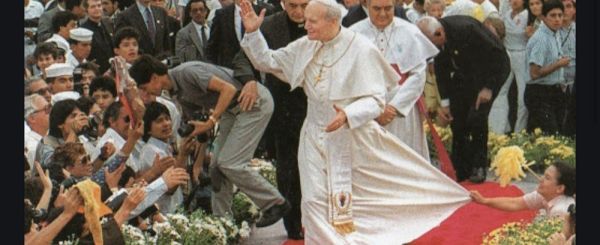"Heart of Jesus, victim of sins, have mercy on us".
1. Dear brothers and sisters, this invocation of the Litany of the Sacred Heart reminds us that Jesus, according to the words of the Apostle Paul, "was put to death for our sins" (Rom 4:25); although, in fact, he had committed no sin, "God treated him as sin for our sake" (2 Cor 5:21). On the Heart of Christ weighed, immense, the weight of the world's sin.
In him, the figure of the "Passover lamb" was perfectly fulfilled, the victim offered to God so that in the sign of his blood the first-born of the Hebrews might be spared (cf. Ex 12:21-27). Rightly, therefore, John the Baptist recognised in him the true "Lamb of God" (Jn 1:29): - innocent lamb, who had taken upon himself the sin of the world in order to immerse it in the healing waters of the Jordan (cf. Mt 3:3-16 et par.); - meek lamb, "led to the slaughter, as a sheep mute before her shearers" (Is 53:7), so that by his divine silence the proud word of unrighteous men might be confounded.
Jesus is a willing victim, because he offered himself "freely to his passion" (Missale Romanum, Prex euchar. II), as a victim of atonement for the sins of men (cf. Lev 1:4; Heb 10:5-10). which he consumed in the fire of his love.
2. Jesus is an eternal victim. Risen from the dead and glorified at the right hand of the Father, he preserves in his immortal body the marks of the wounds of the pierced hands and feet, of the pierced side (cf. Jn 20:27; Lk 24:39-40) and presents them to the Father in his unceasing prayer of intercession on our behalf (cf. Heb 7:25; Rom 8:34).
The admirable sequence of the Easter Mass, recalling this fact of our faith, exhorts:
"To the paschal victim, / let the sacrifice of praise rise today. / The lamb has redeemed his flock. / The innocent has reconciled us sinners with the Father" (Sequentia "Victimae Paschali", str. 1).
And the preface of that solemnity proclaims:
Christ is "the true Lamb who took away the sins of the world, / it is he who by dying destroyed death, / and by rising again gave us life".
3. Brothers and sisters, in this hour of the Marian prayer we have contemplated the Heart of Jesus, the victim of our sins; but first of all and more profoundly than all we contemplated his sorrowful Mother, of whom the liturgy sings: "For the sins of her people / she saw Jesus in the torments / of the harsh torment" (Sequentia "Stabat Mater", str 7).
As we approach the liturgical memorial of the Blessed Virgin Mary of Sorrows, let us remember this intrepid and interceding presence of Our Lady beneath the Cross of Calvary, and let us think with immense gratitude that, at that moment, the dying Christ, victim of the sins of the world, entrusted her to us as Mother: "Behold your Mother" (Jn 19:27).
To Mary we entrust our prayer, as we say to her Son Jesus:
Heart of Jesus,
victim of our sins,
receive our praise,
everlasting gratitude,
sincere repentance.
Have mercy on us,
today and always. Amen.
[Pope John Paul II, Angelus 10 September 1989]












